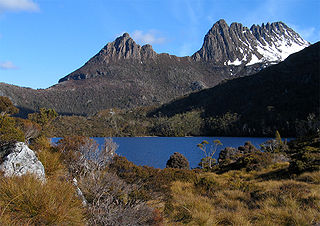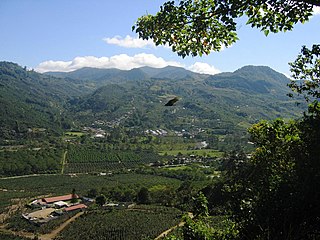
The Derwent River is a river located in Tasmania, Australia. It is also known by the palawa kani name timtumili minanya. The river rises in the state's Central Highlands at Lake St Clair, and descends more than 700 metres (2,300 ft) over a distance of more than 200 kilometres (120 mi), flowing through Hobart, the state's capital city, before emptying into Storm Bay and flowing into the Tasman Sea. The banks of the Derwent were once covered by forests and occupied by Tasmanian Aborigines. European settlers farmed the area and during the 20th century many dams were built on its tributaries for the generation of hydro-electricity.

The pulp and paper industry comprises companies that use wood as raw material and produce pulp, paper, paperboard and other cellulose-based products.

The Tasmanian Wilderness World Heritage Area is a World Heritage Site in Tasmania, Australia.

Christine Anne Milne is a former Australian Senator and was leader of the parliamentary caucus of the Australian Greens from 2012 to 2015. Milne stepped down as leader on 6 May 2015, replaced by Richard Di Natale.

Gunns Limited was a major forestry enterprise located in Tasmania, Australia. It has operations in forest management, woodchipping, sawmilling and veneer production. The company was placed in liquidation in March 2013.

The recycling of paper is the process by which waste paper is turned into new paper products. It has a number of important benefits besides saving trees from being cut down. It is less energy and water intensive than paper made from wood pulp. It saves waste paper from occupying landfill and producing methane as it breaks down. Around two thirds of all paper products in the US are now recovered and recycled, although it does not all become new paper. After repeated processing the fibers become too short for the production of new paper.

Environmental assessment (EA) is the assessment of the environmental consequences of a plan, policy, program, or actual projects prior to the decision to move forward with the proposed action. In this context, the term "environmental impact assessment" (EIA) is usually used when applied to actual projects by individuals or companies and the term "strategic environmental assessment" (SEA) applies to policies, plans and programmes most often proposed by organs of state. Environmental assessments may be governed by rules of administrative procedure regarding public participation and documentation of decision making, and may be subject to judicial review.
Professor Brenda Vale and Doctor Robert Vale are architects, writers, pioneer researchers, and experts in the field of sustainable housing.
The pulp mill dispute was a dispute between Argentina and Uruguay concerning the construction of pulp mills on the Uruguay River. The presidents at the time were Néstor Kirchner (Argentina) and Tabaré Vázquez (Uruguay). As a diplomatic, economic, and public relations conflict between both parties, the dispute also affected tourism and transportation as well as the otherwise amicable relations between the two countries. The feud was unprecedented between the two countries, which have shared historical and cultural ties. Proceedings were brought before the International Court of Justice as a case formally named Pulp Mills on the River Uruguay (Argentina v. Uruguay). It ruled that, although Uruguay failed to inform Argentina of the operations, it did not pollute the river, so closing the pulp mill would be unjustified. The conflict ended in 2010, during the presidencies of Cristina Fernández de Kirchner (Argentina) and José Mujica (Uruguay), with the establishment of a joint coordination of the activities in the river.

Asia Pulp & Paper, also known in the paper industry as APP, based in Jakarta, Indonesia, is one of the largest pulp and paper companies in the world. It was founded by Eka Tjipta Widjaja with the help of co-founder Singgih Wahab Kwik (Kowik) who was also the adviser of the previous owners of Indah Kiat and former head of commissary and deputy of Sinar Mas Group, who had significant ties to the Suharto ruling family in Indonesia. With 14 major companies in Indonesia and China, APP has a current annual combined pulp, paper, and packaging-grade capacity of more than 18 million tons per year, and markets its products to more than 120 countries across six continents.

Woodchipping is the act and industry of chipping wood for pulp. Timber is converted to woodchips and sold, primarily, for paper manufacture. In Australia, woodchips are produced by clearcutting or thinning of native forests or plantations. In other parts of the world, forestry practices such as short rotation coppice are the usual methods adopted.
W.A. Chip & Pulp Co. Pty Ltd is a Western Australian based company, also known by the acronym 'WACAP', and was founded in 1969.
The Labor–Green Accord was a 1989 political agreement between the Labor Party and the Tasmanian Greens to form government in the Australian state of Tasmania after the 1989 general election had resulted in a hung parliament.

The Bell Bay Pulp Mill, also known as the Tamar Valley Pulp Mill or Gunns Pulp Mill, was a proposed $2.3 billion pulp mill in which the former Gunns Limited was planning to build in the Tamar Valley, near Launceston, Tasmania.
Electrolytic Zinc or the Electrolyic Zinc Company of Australasia was the company that operated a Zinc refinery on the banks of the Derwent River in Risdon in Hobart in Tasmania between 1916 and 1984.

Coffee production has played a key role in Costa Rica's history and continues to be important to the country's economy. In 2006, coffee was Costa Rica's number three export, after being the number one cash crop export for several decades. In 1997, the agriculture sector employed 28 percent of the labor force and comprised 20 percent of Costa Rica's total GNP. Production increased from 158,000 tons in 1988 to 168,000 tons in 1992. The largest growing areas are in the provinces of San José, Alajuela, Heredia, Puntarenas, and Cartago. The coffee is exported to other countries in the world and is also exported to cities in Costa Rica.

The Great Lakes Paper Company was the operator of the largest and most modern pulp and paper manufacturing facility in the world. The Company employed over 4,000 in Northern Ontario, starting in 1924 as a pulp mill at Fort William, Ontario. Great Lakes had a highly developed social network within the company, including a children's Christmas party held at a local arena, and an annual picnic held at a local park, as well as many sports teams and other social groups. The company's working environment was enhanced by cultural diversity. For example under the Government of Canada's immigration policy, the "Close Relatives Scheme" resulted in over 400 Ukrainian refugees being employed as workers after World War II.

The environmental impact of paper is significant, which has led to changes in industry and behaviour at both business and personal levels. With the use of modern technology such as the printing press and the highly mechanized harvesting of wood, disposable paper became a relatively cheap commodity, which led to a high level of consumption and waste. The rise in global environmental issues such as air and water pollution, climate change, overflowing landfills and clearcutting have all lead to increased government regulations. There is now a trend towards sustainability in the pulp and paper industry as it moves to reduce clear cutting, water use, greenhouse gas emissions, fossil fuel consumption and clean up its impacts on local water supplies and air pollution.
The Tasmanian Forests Intergovernmental Agreement (TFIA) is an agreement between the Commonwealth of Australia and the State of Tasmania. It is designed to create additional areas of forest reserves in the State of Tasmania, while ensuring ongoing wood supply for the forest industry. It was signed by Australian Prime Minister, Julia Gillard, and Tasmania's Premier, Lara Giddings, on August 7, 2011.
Ketchikan Pulp Company was a pulp mill located on the north shore of Ward Cove, 5 miles (8.0 km) from Ketchikan, in the U.S. state of Alaska. Owned by Louisiana-Pacific, it operated between 1954 and 1997. It was the last pulp mill to operate in the state.














